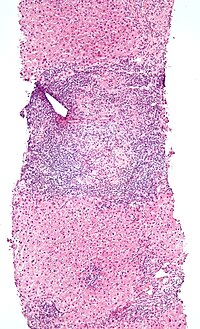
Photo from wikipedia
BACKGROUND & AIMS Intestinal epithelial cells (IECs) provide a barrier that separates the mucosal immune system from the luminal microbiota. IECs constitutively express low levels of major histocompatibility complex (MHC)… Click to show full abstract
BACKGROUND & AIMS Intestinal epithelial cells (IECs) provide a barrier that separates the mucosal immune system from the luminal microbiota. IECs constitutively express low levels of major histocompatibility complex (MHC) class II proteins, which are upregulated upon exposure interferon gamma. We investigated the effects of deleting MHCII proteins specifically in mice with infectious, dextran sodium sulfate (DSS)-, and T cell-induced colitis. METHODS We disrupted the histocompatibility 2, class II antigen A, beta 1 gene (H2-Ab1) in IECs of C57BL/6 mice (I-AbΔIEC) or Rag1-/- mice (Rag1-/-I-AbΔIEC); we used I-AbWT mice as controls. Colitis was induced by administration of DSS, transfer of CD4+CD45RBhi T cells, or infection with Citrobacter rodentium. Colon tissues were collected and analyzed by histology, immunofluorescence, xMAP, and reverse-transcription PCR and organoids were generated. Microbiota (total and IgA-coated) in intestinal samples were analyzed by 16S amplicon profiling. IgA+CD138+ plasma cells from Peyers patches and lamina propria were analyzed by flow cytometry and IgA repertoire was determined by next-generation sequencing. RESULTS Mice with IEC-specific loss of MHCII (I-AbΔIEC mice) developed less severe DSS- or T-cell transfer-induced colitis than control mice. Intestinal tissues from I-AbΔIEC mice had a lower proportion of IgA-coated bacteria compared with control mice, and a reduced luminal concentration of secretory IgA (SIgA) following infection with C rodentium. There was no significant difference in the mucosal IgA repertoire of I-AbΔIEC vs control mice, but opsonization of cultured C rodentium by SIgA isolated from I-AbΔIEC mice was fifty percent lower than that of SIgA from mAbWT mice. Fifty percent of I-AbΔIEC mice died after infection with C rodentium, compared with none of the control mice. We observed a transient but significant expansion of the pathogen in the feces of I-AbΔIEC mice compared to I-AbWT mice. CONCLUSIONS In mice with DSS or T cell-induced colitis, loss of MHCII from IECs reduces but does not eliminate mucosal inflammation. However, in mice with C rodentium-induced colitis, loss of MHCII reduces bacterial clearance by decreasing binding of IgA to commensal and pathogenic bacteria.
Journal Title: Gastroenterology
Year Published: 2020
Link to full text (if available)
Share on Social Media: Sign Up to like & get
recommendations!